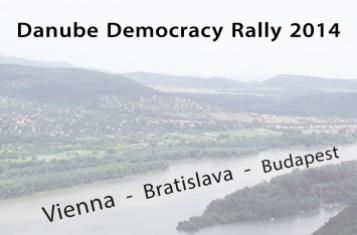Mehr Demokratie: The German media widely reported that in Hungary voting rights were going to be restricted. What is your assessment?
Pállinger: Firstly, the reform is problematic because the government steamrollered it through parliament without trying to seek a consensus. At the level of political culture and the institutions, hardly any barriers exist to the majority's domination anymore. And generally, the new Hungarian electoral law is much more oriented towards the principle of a majoritarian democracy. On the other hand, one has to note that the new electoral law has also had positive effects: the overly large parliament has been reduced by forty per cent – from 386 to 199 seats.
It is stated that Fidesz has adjusted the new, larger constituencies in a way that it is most convenient for the party – a practice, which is called gerrymandering, after the American politician Elbridge Gerry.
This is true. In the future, 106 seats will be allocated via direct mandates (and 93 seats via party lists). The constituencies have been fundamentally changed (this was necessary due to the reductions of mandates) and merged in a way that they favor the current majority. Moreover, the size of the constituencies varies considerably. The majority of model calculations indicate that the new adjustments of the constituencies potentially benefit the government party. With the new constituencies and the new electoral system, Fidesz would probably have won the elections in 2002 and 2006 and not the Socialists.
Are there any further restrictions?
Yes, for instance the changes to party financing. For their election campaigns, direct candidates receive 1 Million Forint (around 3,200 Euro) from the state, which they need to account with a public credit card. If they receive less than two per cent of the votes, they have to pay the money back. Parties can build a nation-wide party list if they nominate candidates in at least nine counties and the capital and at least in twenty-seven individual constituencies. In this case, they receive governmental support for their election camapigns. The support depends on the number of candidates (up to five million Forint max. per candidate). This money is paid out in cash and the conditions of control are much looser than for direct candidates. This provision could potentially create an incentive for parties to create lists when they do not pursue any serious political goals. Under the given circumstances, this weakens the opposition because the votes for the opposition may be split.
Also, it needs to be stressed that foreign Hungarians are treated differently. Ethnic Hungarians without a residence in Hungary can make use of postal voting. However, Hungarians residing abroad still having a place of residence in Hungary, are excluded from postal voting. Instead, they have to vote at previously assigned locations (mostly at embassies and consulates).
Besides the electoral law, there are subordinate regulations, which decrease the opposition's prospects. For example, canvassing at private TV stations is prevented – although not directly. When a party wants to canvass at a private TV station, the trick is that the TV station is obliged to allocate the same amount of canvassing time to all the other parties for free. It is of course not profitable for a private TV station to offer expensive advertisement spots free of charge. The hanging of election posters in public spaces has been made more difficult as well. For instance, it is not allowed to hang up election posters on street lamps as this would endanger traffic saftey and it is also forbidden to hang posters on historic buildings. On commercial advertisement spaces, however, it is allowed to put up election posters. But a large part of these spaces belong to a company that is close to Fidesz. It is therefore not assured that equal treatment is respected.
Finally, one should not forget that Fidesz has used its majority to establish its own majority in independent institutions (constitutional court, permanent members of the election commission etc.).
How are these issues discussed in Hungary?
Hungary is so deeply divided that there are two discourses. The government party claims that it wants to install order and that it tries to eradicate corruption. On the other hand, the opposition classifies this as a restriction of democracy. Depending on the political standpoint, one has either no problem with this electoral law at all, arguing that the legal situation is simply adjusted to the political culture. Or one claims that the electoral law disadvantages smaller parties and consolidates the power of Fidesz. From an outside point of view and within science, these problems are seen much more clearly. Yet in Hungary every position is simply regarded as party opinion; it is like a sort of tribal thinking.
In the German media it was not very clear what the new electoral law would mean for ethnic minorities.
In Hungary, the representation of ethnic minorities is an unsolved problem since the system has changed. The new electoral system provides a reservation of a seat in parliament for each recognised ethnic minority. This seat is occupied according to a special list of the self-administrating minorities. These are no parties but quasi-autonomous organs. As a member of a minority wishing to vote for such a list, it is obligatory to become registered. This leads to the loss of the right to cast the second vote. On a positive note, the minority lists do not have to exceed the five per cent threshold. Instead, a reduced threshold applies for these lists (one quarter of the votes that are mathematically necessary for a mandate via the nation-wide list). If a minority list passes this special threshold, it can send one – and only one – member to parliament. If they do not exceed the threshold, the first candidate of the minority list can sit in parliament solely as a spokesperson without being granted any voting rights.
This entails several implications. First, this provision discriminates against minority parties. There is, for instance, a Roma party that wants to be registered for the elections. But it could only be voted for by people who had not previously registered themselves as members of the Roma. Second, for instance the organisation of Roma is very close to Fidesz. Hence, as a registered Roma you can only vote for a list that is close to Fidesz. Here applies an ethnic principle: if you are member of a minority, your political identiy and political differences are secondary; only the ethnic membership counts.
How is the allocation of seats in parliament calculated in Hungary? How many votes does a party need in order to occupy a seat in parliament that is won by the list?
The allocation of seats is relatively complicated. It is impossible to predict beforehand how many votes are necessary for a seat that is won by the list. First, the rest votes from the one-person-constituencies are added to the number of list votes (minority lists included). Hereby, one has to take into account that not only those votes are included in the calculations that were given to candidates who had failed to achieve a direct mandate. The votes, which the successful candidates did not need in order to win the mandate, are included as well. Afterwards, the number of minority representatives is determined. The number of the provided list mandates (93) is then reduced by the number of minority representatives. Following this calculation, the mandates are allocated between those parties that exceeded the five per cent threshold in line with the D'Hondt system (for alliances of two parties the threshold lies at ten per cent, for alliances of three and more parties at fivteen per cent).
Who determines the topics of the election campaign?
Interestingly, the government is almost exclusively setting the agenda. During the election campaign it had created the topic of reduction of household expenditure. Until 2013, Hungarians had to pay much more for electricity, water or banking transactions than the rest of Europe. Then the government had decreased the costs via a law. It merged this issue together with the conflict with the International Monetary Fund (IMF) as an economic fight for freedom. This is of course controversial but it is very close to the wallets of the people. For this year, cuts in costs for electricity and gas have been announced again.
In addition, the restrictions to canvassing do not apply for „government information“. The government largely advertises its politics with slogans such as „Hungary shows a better performance“ and claims that macroeconomic data looked better, unemployement and public deficit were decreasing, order was re-established and that there wasn't any corruption. In comparison, there is the left camp, which doubts the economic success and argues that existing problems have been blurred and that the rule of law was constrained in Hungary. At the same time, both sides pursue a dirty campaign and personalise very heavily.
Moreover, the government can point to the fact that members of the left electoral alliance partly take on contradictory positions and that the people in power are the ones who had ruined the country between 2002 and 2010.
How does the situation of direct democracy look like in Hungary?
That is a very sad topic. Firstly, the right of parliamentarians to announce national referendums has been restricted. Now, this is only possible on request of the government and the President. (Besides, there is also the possibility to launch a national referendum through a citizens initiative). Secondly, a fifty per cent turnout quorum has replaced the twenty-five per cent approval quorum. In the last couple of years only three out of twelve proposals had met a fifty per cent turnout. In the future, therefore it will be much more difficult for national referendums. Thirdly, there is no support by the government for initiatives. In this regard, I am not talking about material support but about formal and substantial support. In Hungary, it is obligatory to submit the text of the initiative to the national electoral commission who then decides if the question is admissible – the national electoral commission is, however, not obliged to issue an explanation. In the past, this often led to a „ping pong“. The initiators had tried to word their question correctly until it was accepted by the electoral commission. Moreover, no objective information about the initiatives is available as it is common in the Swiss leaflet for a referendum. Additionally, there is no government agency, which is obliged to objectively assess the initiative and its implications as it is the case for California, which has a legislative analyst. As a consequence, parties only pursue party propaganda - objective information is not available. Fourth, the representative system and direct democracy are not interconnected. When 200,000 signatures have been gathered, the parliament has to schedule a national referendum. However, it does not have to deliver a statement, it cannot issue a counterproposal, it does not even have to debate the initiative's content. This of course prevents a dialogue between representative and direct democracy. This interpretation of direct democracy is not user-friendly.
Check out Hungary's legal instruments of direct democracy at the Direct Democracy Navigator
Questions by Mehr Demokratie e.V., Deutschland (More Democracy Germany). Translation into English by Democracy International.
Many thanks to Mehr Demokratie Deutschland for providing us with this interview.



